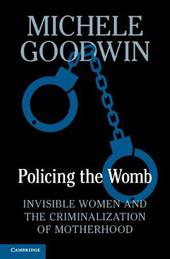
|
Policing the Womb: Invisible Women and the Criminalization of Motherhood
Hardback
Main Details
| Title |
Policing the Womb: Invisible Women and the Criminalization of Motherhood
|
| Authors and Contributors |
By (author) Michele Goodwin
|
| Physical Properties |
| Format:Hardback | | Pages:334 | | Dimensions(mm): Height 235,Width 158 |
|
| ISBN/Barcode |
9781107030176
|
| Classifications | Dewey:305.420973 |
|---|
| Audience | | Professional & Vocational | |
|---|
| Illustrations |
1 Line drawings, black and white
|
|
Publishing Details |
| Publisher |
Cambridge University Press
|
| Imprint |
Cambridge University Press
|
| Publication Date |
12 March 2020 |
| Publication Country |
United Kingdom
|
Description
In Policing the Womb, Michele Goodwin explores how states abuse laws and infringe on rights to police women and their pregnancies. This book looks at the impact of these often arbitrary laws which can result in the punishment, incarceration, and humiliation of women, particularly poor women and women of color. Frequently based on unscientific claims of endangering a fetus, these laws allow extraordinary powers to state authorities over reproductive freedom and pregnancies. In this book, Michele Goodwin discusses real examples of women whose pregnancies have been controlled by the law and what has led to the United States being the deadliest country in the developed world for a woman to be pregnant.
Author Biography
Michele Goodwin is an Executive Committee member of the American Civil Liberties Union and elected member of the American Law Institute. She is also a Chancellor's Professor at the University of California, Irvine where she teaches constitutional law and directs the Center for Biotechnology and Global Health Policy. She is an internationally recognized voice on women's rights, reproductive health, and constitutional law and lectures worldwide on matters relating to the exploitation of women and girls and the rising regulation of pregnancy and criminalization of women.
Reviews'Policing the Womb exposes a new era of reproductive policing and harm in the United States that has gone largely unnoticed.' Boston Review
|